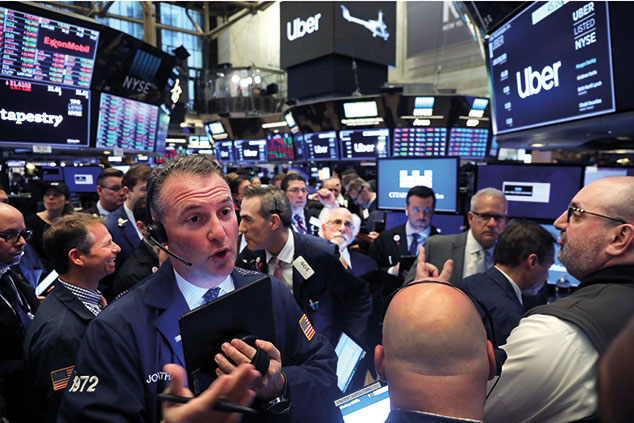
British investors in overseas stocks have long had to grapple with exorbitant fees and arduous paperwork. But now mounting competition is bringing share-dealing costs down rapidly. We have a proper battle under way to provide access to the US stockmarket with a range of options, all based on apps via your phone.
The pioneer is Freetrade, which as the name indicates offers free trading for over 300 stocks; more than 134 are US shares. The free service is for end-of-the-day trades, whereas if you want to trade at your convenience rather than wait, you can have real-time orders for £1 a trade.
Next into the market was fintech unicorn Revolut. It has started offering its (paid-for) Metal card customers 100 commission-free trades a month on over 300 US-listed stocks on the New York Stock Exchange (the NYSE) and the technology-dominated Nasdaq exchange. It is not entirely free: there’s a 0.01% annual custody fee and to begin with there will be a limit of $1,000 worth of shares per order plus a maximum of 100 commission-free trades every month. When it is launched for standard customers they’ll be able to make three free trades per month, with any trades above that frequency charged at £1 per trade.
Meanwhile, last week saw the launch in the UK of an Australian free share-dealing outfit called Stake. Its brand-new service will be offering access to the main universe of US stocks. That means over 3,000 equities and more than 740 exchange-traded funds (ETFs) across both the NYSE and Nasdaq. Trades are free (and unlimited), and take place in real time.
Stake makes its money on the transfer of sterling into dollars for the account. It charges a spread (between 0.2% and 0.5%) that isn’t too onerous compared with the standard 1% on many traditional share-dealing platforms. Freetrade, by comparison, charges 0.45% for the foreign-exchange spread. And lurking in the background is Robin Hood, the major US platform set to come to Britain soon.
The world’s dominant exchange
It is well worth dabbling in US shares, especially if you can keep costs down by putting the stocks in an Isa or Sipp (only possible, to my knowledge, on Freetrade). The US market is simply a deeper, broader, more liquid market with much more choice than its counterparts.
American shares account for 53% of the MSCI World index, the major index for developed-world stocks; UK stocks account for just 5%. The NYSE has over 2,800 stocks and boasts 1.46 billion shares traded each day, while Nasdaq has 3,300 firms listed with 1.8 billion trades a day. The London Stock Exchange (LSE) has 2,600 firms from 60 countries.
Remember, too, that ETFs are a cheap and effective way of buying a basket of stocks for a portfolio. There are 6,478 ETFs listed worldwide and according to US website etfdb.com, there are 2,314 listed in the US, but 1,241 ETFs listed in London. The SPDR S&P 500, which tracks the S&P 500 index, has more dollars moving through it than the LSE and the French stockmarket combined. The derivatives market also reflects US dominance. America has $98bn in daily turnover, while the whole of Europe does $6bn a day. The US market is 16 times larger than all the European continental ones put together.
The US market simply has more choice for virtually every niche imaginable. That’s most obvious not only in ETFs, but also in growth sectors such as technology stocks – where the UK (in truth, Europe generally) is a long way behind. If we put the NYSE and Nasdaq together, dollars moving through Apple and Amazon stock each day constitute more than the entire flow through LSE stocks.
Keep an eye on the tax regime
Nevertheless, there are some obvious, non-trivial disadvantages when it comes to buying and selling American stocks, the most obvious being the fact that US shares trade in dollars. Moves up and down in the cable rate – the nickname for the sterling-dollar exchange rate – can have a huge impact on investment returns.
And do bear in mind that we could well see a post-Brexit sterling rebound. That would eat into returns for a British investor in US stocks, as they would fetch fewer pounds when translated back into sterling. That said, Brexit jitters aside, the cable rate has been fairly stable for many years and the volatility of the foreign-exchange markets is usually overstated.
The other less obvious disadvantage is the fiendishly complicated US tax regime, principally its withholding tax on dividends and income remitted by US-listed businesses. Ordinarily this can amount to 30% of that income, which makes a big dent in returns. But this can be mitigated, reduced, or even eliminated by using the W-8 BEN, which is an Internal Revenue Service (IRS) form that serves as a Certificate of Foreign Status of Beneficial Owner.
By completing this form you confirm that you are not a US taxpayer and that a reduced rating of withholding tax may be applied. In this way the withholding tax rates can be reduced from 30% to 15% – or to 0% if the investment is held in a tax-free wrapper in the UK. A W-8 BEN is valid for three calendar years after the year in which it was signed. It really helps, too, that all the tech-based app platforms make filling out this form a walk in the park.